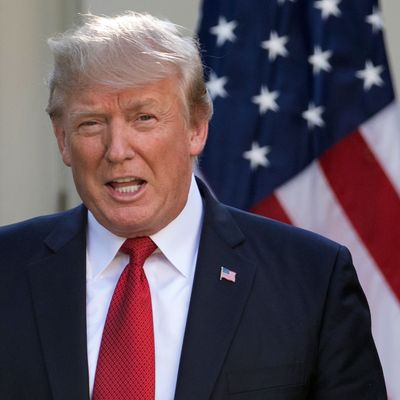
On Monday night, the White House warned that Syria’s Bashar al-Assad is preparing another chemical-weapons attack, and that if he follows through with it there will be “a heavy price.” The universal response was surprise. Because nothing can be assumed in analyzing the national-security actions of this administration — including competence or traditionally responsible intentions — two big questions hung over the announcement. First: Was it true? Second: As hopes for quick passage of the GOP health-care bill were fading, might it have been a cynical effort to distract from the chaos playing out on Capitol Hill?
What got skeptical spider-senses tingling on Twitter is how quickly officials from the Pentagon, State Department, and Central Command (the arm of the military that would carry out those strikes Spicer threatened) said they hadn’t been told of this warning in advance — and were not clear on what intelligence had provoked it. Commenters who either wanted to defend Trump or intimate they were privy to insider knowledge suggested that perhaps the warning was based on intelligence so secret that folks at the Pentagon and State didn’t know about it.
On the matter of factual veracity, let’s be clear about just how likely it is that Assad is in fact close to using chemical weapons. The U.N. has documented 160 cases of chemical-weapons use in Syria over the last six years, and considers another 131 incidents suspicious but unproven. The majority were committed by the Assad regime. Three hundred chemical attacks over six years — you do the math. The Trump administration could issue this warning once a week and be right more often than not. (Most chemical attacks since the 2014 effort to remove Assad’s weapons stocks seem to have weaponized commonly available chemicals such as chlorine. So as long as Bashar can keep his family’s swimming pools sparkling, he can also gas his opponents.)
Whatever intelligence the Trump administration had to show was enough to engender polite and cooperative responses from Britain and France. The French government said that Trump had spoken with President Macron — who just days earlier was trolling him to energize voters in parliamentary elections — about the need to forge a “common response” in the event of another attack. This is not diplomatic-speak for “we believe you,” but it’s not “get lost” either.
On Tuesday, no use of chemical weapons materialized — just another day of the regime attacking opposition forces in western Syria, close to the capital Damascus, the area Assad sees as his heartland. Meanwhile, U.S.-backed insurgents continued their slow advance on ISIS capital Raqqa, hundreds of miles away in the east. Just another day of regional geopolitics and nonchemical death for innocent civilians.
On Tuesday, the administration also offered its story of how the decision played out. Trump received the intelligence Monday morning. By the time the secretaries of State and Defense arrived at the White House for meetings with Indian Prime Minister Modi, Politico reported, they “were informed” of the plan to issue a statement, White House officials said, and had the opportunity to “work the language.” National Security Adviser H.R. McMaster “had already been briefed and weighed in on the plan.” Administration officials told the New York Times that cabinet members were “aware of” the plan to issue a statement.
But those passive constructions are not normal. A president’s national security adviser doesn’t get briefed on presidential statements on breaking security issues — he or she proposes them, chairs the meetings at which they are decided, and drafts them. Secretaries of Defense aren’t just “aware” of redline threats to use military force — they have explicitly signed off on them and have the Pentagon humming on plans to implement them. Secretaries of State are intimately engaged, not just “informed,” of plans to issue a military warning to a Russian client state.
It is not normal to move decision-making around highly sensitive intelligence from the president’s intelligence briefing directly to the press office, and only later back to the security professionals to work the text. Who were the objects of all those passive sentences, the senior officials doing the deciding and briefing and drafting? Was it just Spicey at his desk?
Plenty of critics on the left saw this as a Wag the Dog scenario of made-up intelligence. But the conflict in Syria is a dog that can wag its own tail, and ours too if we let it. And if the Trump White House is issuing ultimatums that its own national-security team doesn’t want to take full responsibility for, based on intelligence that is too secret to share with mid-level staff but not too secret to brief to Congress, chances are it’s not fully briefed on how that wagging tail will affect key players like Russia and Iran. That’s worse than cynical. It’s dumb.





























